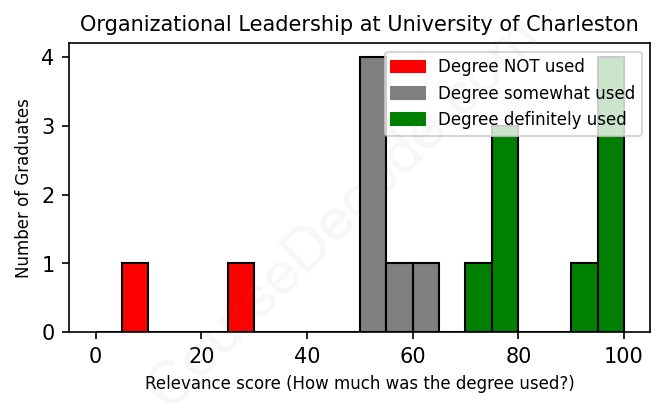
First, some facts. Of the Organizational Leadership graduates from University of Charleston we've analyzed , here's how many have used (or NOT used) their degree in their career:

These are estimates based on AI analysis of 17 LinkedIn profiles (see below).
The verdict? On par with the average. Overall, with an average relevance score of 67%, Organizational Leadership graduates from University of Charleston have about the same likelihood of finding work in this field as the average graduate across all fields:
And for comparison, here's the chart for all profiles we've looked at across all degrees.
Also, after graduating, 35% of these graduates have pursued further education other than another Bachelor's degree (such as a Masters degree or other), which is right in line with the average across all fields.
See the details:
|
Relevance score: 55% We think this person has gone into a career only somewhat relevant to their degree. We think this person has gone into a career only somewhat relevant to their degree.
DEGREE INFOGraduated in 2020 from University of Charleston with a Bachelor of Science - BS in Organizational Leadership. No other secondary education since. JOB HISTORY SINCE GRADUATIONCorporate Fellow Honeywell May 2022 - Jul 2022 Ordnance Maintenance Analyst  United States Marine Corps Jan 2021 - Aug 2022 Production Supervisor  Kansas City National Security Campus Aug 2022 - Present ABOUTI am a self-motivated and accomplished professional with extensive experience in maintenance, training, logistics, operations and customer service. Proven ability to create and lead high performing teams that successfully manage complex organizational operations and objectives. I have a successful record of building and maintaining rapport with diverse groups through effective interpersonal communication skills |
The top 10 most common jobs done by the graduates we've analyzed (ranked most common to least) are:
Based on the job titles and positions that graduates of the University of Charleston’s Organizational Leadership program have held, it seems like a lot of them are landing roles in management and leadership, particularly within the military and operations sectors. Many graduates have worked as Program Managers, Operations Managers, and various leadership roles within the U.S. Navy and Marine Corps, which definitely require the type of strategic thinking and team management skills that are emphasized in an Organizational Leadership degree. However, it's interesting to see that not all jobs directly align with the core theories and frameworks learned in the program. Some roles, like service managers or logistics positions, may emphasize organization and leadership but aren't heavily focused on the more theoretical parts of the degree.
Overall, it looks like a majority of the jobs are somewhat relevant to Organizational Leadership. There’s a blend of positions like Project Managers and Senior Operations Managers that align closely with the program's focus, while some others, such as financial professionals or even teachers, might only utilize parts of the skill set. It’s a mixed bag but a hopeful sign for students that there are various paths to leadership available, even if some positions require a broader application of skills rather than a direct one-to-one use of what they studied. The program seems to equip grads with a versatile skill set, which can be applied in many different roles, even those that don’t directly scream "Organizational Leadership." So, overall, while many positions are relevant, some diverge from the specific teachings of the degree, reflecting the diversity of career choices out there.
Here is a visual representation of the most common words in job titles for Organizational Leadership graduates (this is across all Organizational Leadership graduates we've analyzed, not just those who went to University of Charleston):

Based on the careers of these graduates from the University of Charleston who studied Organizational Leadership, it seems like many of them have taken up roles tied closely to leadership and management early on in their careers. Many of them, especially those graduating from 2016 to 2019, started off in military roles or operations management positions, like Command Chief Warrant Officers or Operations Managers with the Navy and Marine Corps. It looks like the experience they gained in the military has given them a solid foundation for advancing into managerial roles in both military and civilian sectors, leading to positions like Project Manager, Director of Operations, and even Chief Executive Officer. This shows that the degree is quite relevant for those aiming for leadership roles right out of college.
Fast forward five to ten years later, and many of these graduates tend to climb the ladder quite successfully. For example, graduates who began as Operations Managers or Associates often transition into higher roles such as Director or Senior Management positions at established companies. The variety in the jobs – from consulting to educational administration – highlights the versatility that an Organizational Leadership degree can offer. While there are a few folks who drift into seemingly unrelated fields, like teaching or real estate, the majority appear to maintain a focus on leadership and operational roles, reflecting positively on the relevance of their degree. Overall, it looks like University of Charleston graduates are doing quite well in pursuing meaningful careers that align with their Organizational Leadership education, showing promising trajectories for future graduates considering this path.
Getting a Bachelor’s degree in Organizational Leadership, whether at the University of Charleston or elsewhere, tends to be on the easier side compared to some other more technical degrees. It usually involves a lot of group projects, discussions, and practical assignments, which can actually be pretty engaging if you like working with people. You’ll be learning about topics like communication, team building, and management principles, which are more about understanding concepts than memorizing complex formulas or theories. However, it’s still important to stay on top of your assignments and participate actively, because being engaged is key to getting the most out of this degree. Overall, if you put in the effort and are interested in the subject, you should find it manageable!
Most commonly, in the LinkedIn profiles we've looked at, it takes people 2 years to finish a Bachelor degree in Organizational Leadership.
Based on the job histories of these University of Charleston Organizational Leadership graduates, it seems like many of them have landed solid roles with decent pay, especially those in military-related positions and management roles in large companies. For example, roles like Operations Manager for Naval Special Warfare and Program Manager at Leidos generally come with good salaries and benefits. Even those in the education sector or more entry-level positions often have opportunities for growth and salary increases over time. While it’s tough to tell exact figures without more info, the career paths they’re on suggest they’re making a comfortable living, especially with their leadership backgrounds. So, overall, it looks like they're doing pretty well for themselves!
Here is a visual representation of the most common words seen in the "about" section of LinkedIn profiles who have a Bachelor degree in Organizational Leadership (this is across all Organizational Leadership graduates we've analyzed, not just those who went to University of Charleston). This may or may not be useful:

Here are all colleges offering a Bachelor degree in Organizational Leadership (ordered by the average relevance score of their Organizational Leadership graduates, best to worst) where we have analyzed at least 10 of their graduates:
| College | Score | Count |
|---|---|---|
 Texas A&M University-Commerce Texas A&M University-Commerce
|
74 | 16 |
 Arizona State University Arizona State University
|
72 | 23 |
 University of Louisville University of Louisville
|
69 | 10 |
 Purdue University Purdue University
|
67 | 12 |
 University of Charleston University of Charleston
|
67 | 17 |
 University of Cincinnati University of Cincinnati
|
66 | 13 |
 Trident University International Trident University International
|
65 | 10 |
 South Texas College South Texas College
|
65 | 11 |
 Southern Nazarene University Southern Nazarene University
|
63 | 15 |
 Ashford University Ashford University
|
58 | 20 |
 Azusa Pacific University Azusa Pacific University
|
58 | 11 |
 Northern Kentucky University Northern Kentucky University
|
57 | 25 |
 Wright State University Wright State University
|
52 | 24 |